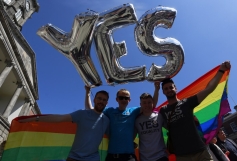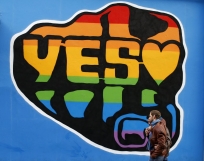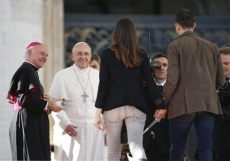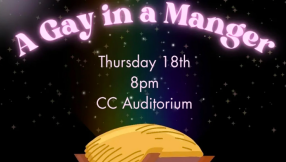Times journalist, self-declared atheist and gay activist Matthew Parris has laid down a challenge to the Church.
He wrote in the light of comments on the Irish gay marriage referendum by the Archbishop of Dublin, Most Rev Diarmuid Martin, who declared: "It's a social revolution that didn't begin today... It's a social revolution that's been going on, and perhaps in the Church people have not been as clear in understanding what that involved."
Parris asked in a Spectator article where the Church's convictions have gone. "Even as a (gay) atheist, I wince to see the philosophical mess that religious conservatives are making of their case," he says. "Is there nobody of any intellectual stature left in our English Church, or the Roman Church, to frame the argument against Christianity's slide into just going with the flow of social and cultural change?"
Parris' piece raises some interesting points.
1. Should the Church change?
Parris is critical of the Church changing with the times. There are two sides to this. The Church is described in the Bible as a family, the body of Christ and also his bride. These are organic metaphors, not ones that suit a static institution. Families, bodies and brides are adaptable. They need to grow and mature and change to meet new circumstances. You can see this adaptability in the earliest history of the Church, the book of Acts. The Church changed from being a Jewish-only group to a multicultural family as the gospel spread across the Roman Empire. So it is not wrong per se for the Church to re-examine its practices in light of the changing culture it finds itself in.
The flip side of this is that the Church needs to be faithful to its founder and his founding principles. Jesus did not fit neatly into the culture of his day and the gospel calls every culture to submit to his lordship. This is why Christians were killed by Roman emperors: when they confessed 'Jesus is Lord' it challenged their imperial primacy. So Parris has a point when he calls the Church to stay faithful to its master and not just cave in to public pressure. The only time the Church should change is when she realises that she has misunderstood or misinterpreted the scriptures.
2. Are evangelicals just ranting and dim?
Parris writes: "Time was – even in my time – when there were quiet, understated, sometimes quite severe men of the cloth, often wearing bifocal spectacles, who could show us moral relativists a decent fight in that eternal debate. Now there's only the emotional witness of the ranting evangelicals, most of them pretty dim."
Cheap shot from Parris on both the intellectual prowess of evangelicals and the gender and eyewear of the old guard clerics. You can find both well-sighted clerics and intellectually credible evangelicals, so sticking to simplistic stereotypes is beneath a journalist of Parris' stature.
He is correct that a lot of emotionalised drivel that bears little resemblance to biblical Christianity is put out across various media platforms. But you don't have to look far to find reasoned and gracious argument on the issues at hand. For instance, Bishop Tom Wright and Dr Paula Gooder are hardly emotional ranters but they are still evangelicals. Parris might also be directed to listen to the Archbishop of Canterbury and his bishops in the House of Lords or some of the spokespeople from the Evangelical Alliance or Catholic Voices.
3. Can the majority be wrong?
Parris says: "It must surely be implicit in the claim of any of the world's great religions that on questions of morality, a majority may be wrong; but this should be vividly evident to Christians in particular: they need only consider the fate of their Messiah, and the persecution of adherents to the Early Church. 'Blessed are ye when men shall revile you and persecute you,' says Paul."
Here I couldn't agree with him more. There is a need for the Church to have the courage of her convictions and not simply cave into public opinion. As the bumper sticker puts it: "Eat Cow Dung. 10 million flies can't be wrong". The majority are not always right.
Parris is right that ethics are not to be decided democratically. The doctrine of the Church is not to be decided by public opinion. But equally we must recognise that the Church does not have the right to dictate to the world how to live. Christians do not have the authority to set the laws of a nation. In a democracy the Church's role is to be faithful to scripture in word and deed. The Church can speak up and speak out, but it does not have the power to legislate.
In a pluralistic culture the Church has to make a case and it is up to the lawmakers to work out how to legislate. The Church needs to act with integrity, following in the footsteps of Christ who held the highest moral standards and yet acted with grace and compassion to those who failed those standards.
There will be consequences for holding a different set of views and values from those of the majority. There always have been and there always will be. But the Church has a track record of outliving ideologies and cultural mores. She did not fit neatly into Roman world and challenged the state's disregard for the weak and vulnerable. The Church around the globe is currently is facing violent opposition from ISIS and Boko Haram. The Church is being faithful in those contexts and must continue to be faithful everywhere.
4. Is morality relative?
Parris says he misses the fight with those who would challenge him and other moral relativists. The thing is, I have never met a genuine moral relativist. In fact I don't believe they really exist. I don't think they really believe what they think they do: that there is no ultimate difference between child abuse and good parenting, between genocide and caring for the sick. As a foster carer looking after children, many of whom have been abused, I believe firmly that moral relativism is a myth – unless you want me to tell the children our family has cared for that their abuse was not absolutely morally wrong. The moral relativists do not have a case worth presenting.
Matthew Parris has written a helpful challenge to the Church, though not flawless, which needs to be taken seriously. Some are sceptical of his motives in writing, arguing that he is simply baiting the Church to speak out so that he can have a dig at their position from another perspective. I personally believe he is right to call out the Church to have the courage of its convictions. We must do so, but while modelling the grace of Christ our master.
Krish Kandiah is a contributing editor to Christian Today. He is president of London School of Theology and founder and director of Home for Good. You can follow him on Twitter: @krishk

















